For a recap video and photos of Family Fellowship Week, visit familyfellowshipweek.com/2018-in-review
Daily Sessions
Each message below contains links to the audio via our Uplift podcast site. In order for the direct links to work, you must be logged in with the username: wwntbm and the password: gospel.
The Influence of the Cross on Peter’s Life, Ministry, and Writing
Dwight Williams
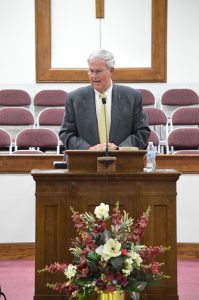 When Peter first met Christ, Jesus changed his name. God knew where he came from, where he was, and by grace and the power of the cross, what Peter would one day be. Peter learned to believe God and step out on the promises of God. None of the disciples had greater events transpire in their lives around the crucifixion than Peter. Imagine the impact on Peter as Christ turned to look at him following his betrayal. Peter turned away from the light into the darkness to weep, but the Lord was not finished with him. Upon His resurrection, the Lord specifically sent a message to Peter that there was still a ministry for him. Thank God that He will work in us to comfort, correct, cleanse, and change us, then send us out to continue His work. Peter never got over the cross. He wrote some of the most tender passages of the Bible, as he challenged us to desire the milk of the Word to grow and to cast our cares on Christ. Peter knew that as the devil desired to have him, Christ was interceding for him. We too can take comfort in this truth.
When Peter first met Christ, Jesus changed his name. God knew where he came from, where he was, and by grace and the power of the cross, what Peter would one day be. Peter learned to believe God and step out on the promises of God. None of the disciples had greater events transpire in their lives around the crucifixion than Peter. Imagine the impact on Peter as Christ turned to look at him following his betrayal. Peter turned away from the light into the darkness to weep, but the Lord was not finished with him. Upon His resurrection, the Lord specifically sent a message to Peter that there was still a ministry for him. Thank God that He will work in us to comfort, correct, cleanse, and change us, then send us out to continue His work. Peter never got over the cross. He wrote some of the most tender passages of the Bible, as he challenged us to desire the milk of the Word to grow and to cast our cares on Christ. Peter knew that as the devil desired to have him, Christ was interceding for him. We too can take comfort in this truth.
The Influence of the Cross on Christ’s Ministry
Mike Renfrow
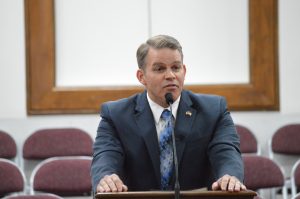 We see the love of God not in the roses, flowers, and trees, but in the cross of Christ. The cross was not an accident, but a fulfillment of Scripture. Christ knew as He went to the cross that He was in the will of the Father. The cross was the mission of his ministry. It was His purpose to fulfill the Father’s mission. The cross was the message of his ministry, and throughout his time with his disciples, He preached the cross. The cross was also the memorial of His ministry. It speaks of God’s love, faithfulness, mercy, and forgiveness. The cross speaks of God’s wrath on sin, and of God’s holiness. Because of the cross, we must praise God, proclaim his power, put Christ first, and have a greater hatred for the sin that placed Christ on the cross.
We see the love of God not in the roses, flowers, and trees, but in the cross of Christ. The cross was not an accident, but a fulfillment of Scripture. Christ knew as He went to the cross that He was in the will of the Father. The cross was the mission of his ministry. It was His purpose to fulfill the Father’s mission. The cross was the message of his ministry, and throughout his time with his disciples, He preached the cross. The cross was also the memorial of His ministry. It speaks of God’s love, faithfulness, mercy, and forgiveness. The cross speaks of God’s wrath on sin, and of God’s holiness. Because of the cross, we must praise God, proclaim his power, put Christ first, and have a greater hatred for the sin that placed Christ on the cross.
The Influence of the Cross on Nicodemus and Joseph of Arimathea
Daniel Fetter
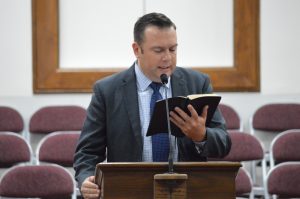 Immediately after the crucifixion, many things continued as usual. The Romans were still in charge. Preparations for the Passover went on. But because of the cross, we see a change in these two men. They were religious men. They were also rich men. Their method of discipleship before the cross was in secret. Both held prominent positions and did not want to identify with Christ in the open. The cross gave them a mission and changed their perspective. They became bold to take a stand and openly beg for the body of Jesus, thus identifying themselves with him. By so doing, they fulfilled the prophecy that Christ would be buried with the rich in his death. I Corinthians 2:5 holds a key for all disciples. Our faith must stand in the power of God so that in our weakness His power can be revealed in us.
Immediately after the crucifixion, many things continued as usual. The Romans were still in charge. Preparations for the Passover went on. But because of the cross, we see a change in these two men. They were religious men. They were also rich men. Their method of discipleship before the cross was in secret. Both held prominent positions and did not want to identify with Christ in the open. The cross gave them a mission and changed their perspective. They became bold to take a stand and openly beg for the body of Jesus, thus identifying themselves with him. By so doing, they fulfilled the prophecy that Christ would be buried with the rich in his death. I Corinthians 2:5 holds a key for all disciples. Our faith must stand in the power of God so that in our weakness His power can be revealed in us.
The Influence of the Cross on Mary and the Women
Allen Mercer
 As we think of the power of the gospel, we must not stop at the cross, but remember that the whole message includes the resurrection. Remember that the full story of Christ’s love and sacrifice gives us our motivation for ministry. When we think of Mary Magdalene and the other ladies who approached the empty tomb, we must remember their past. These were ladies who had been helped by the Lord in some way, and in return for his ministry they loved Him, followed Him, and ministered to His earthly needs. They watched His death from afar, fearful perhaps of associating too closely. But, their relationship with Christ did not end at the cross! Christ had a future for them as well. As He met them in the garden, His message was for them to “come and see; then go and tell.” The resurrection changed them and the other disciples from worriers into warriors, from fearful to fighters, from doubtful to daring, and from weak to bold witnesses.
As we think of the power of the gospel, we must not stop at the cross, but remember that the whole message includes the resurrection. Remember that the full story of Christ’s love and sacrifice gives us our motivation for ministry. When we think of Mary Magdalene and the other ladies who approached the empty tomb, we must remember their past. These were ladies who had been helped by the Lord in some way, and in return for his ministry they loved Him, followed Him, and ministered to His earthly needs. They watched His death from afar, fearful perhaps of associating too closely. But, their relationship with Christ did not end at the cross! Christ had a future for them as well. As He met them in the garden, His message was for them to “come and see; then go and tell.” The resurrection changed them and the other disciples from worriers into warriors, from fearful to fighters, from doubtful to daring, and from weak to bold witnesses.
The Influence of the Cross on Christ While on the Cross
Jeremy Lockhart
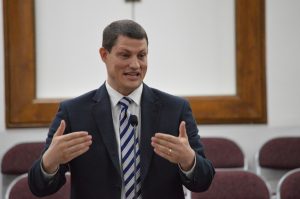 As Christ hung on the cross he spoke seven sayings that give us a glimpse into the heart of God. The place from which Christ said these words is important. It was not a place of comfort, but crushing anguish; not a place of royalty but wretchedness; not from a palace but a cross. These words were spoken not to a multitude who magnified him but to enemies who mocked him. The words Christ spoke on the cross include the power to provide pardon, and because of Christ’s forgiveness, we too can forgive others. His words promised eternal life to the vilest of sinners, thereby giving us assurance. He spoke peace in the midst of Mary’s pain as she watched the sword pierce His side. We too can leave our burdens at the cross and accept His peace. Christ was our sinless yet selfless substitute, who was forsaken of His father that we need never be forsaken. His words of thirst prove that He can sympathize in our suffering. His victory cry of “It is finished!” settled our sin debt.
As Christ hung on the cross he spoke seven sayings that give us a glimpse into the heart of God. The place from which Christ said these words is important. It was not a place of comfort, but crushing anguish; not a place of royalty but wretchedness; not from a palace but a cross. These words were spoken not to a multitude who magnified him but to enemies who mocked him. The words Christ spoke on the cross include the power to provide pardon, and because of Christ’s forgiveness, we too can forgive others. His words promised eternal life to the vilest of sinners, thereby giving us assurance. He spoke peace in the midst of Mary’s pain as she watched the sword pierce His side. We too can leave our burdens at the cross and accept His peace. Christ was our sinless yet selfless substitute, who was forsaken of His father that we need never be forsaken. His words of thirst prove that He can sympathize in our suffering. His victory cry of “It is finished!” settled our sin debt.
The Influence of the Cross in the Epistle to the Galatians
Michael West
 Paul’s fierce devotion to Calvary is evident throughout the book of Galatians. To him, the cross represented not object or symbol of worship but a doctrine to change His life. We too must be consumed with understanding Christ’s love for us, for when we take our eyes off of the cross we will back away from our commitment to Christ. The book of Galatians shows us that the cross
Paul’s fierce devotion to Calvary is evident throughout the book of Galatians. To him, the cross represented not object or symbol of worship but a doctrine to change His life. We too must be consumed with understanding Christ’s love for us, for when we take our eyes off of the cross we will back away from our commitment to Christ. The book of Galatians shows us that the cross
Cancels our sin,
Reveals his love,
Offers divine blessings,
Satisfies our souls, and
Separates us from the world through sanctification.
To enjoy the benefits of this doctrine we must participate, first by believing and accepting salvation, and then by counting ourselves dead to sin and choosing to follow Christ in the process of sanctification. We must come to the place where we know that God Himself is enough for us. When we have a right view of the cross we can rest in the providence, security, and love of our eternal God.
The Influence of the Cross on Our Preaching
Tim Daniel
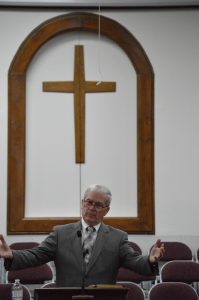 We must realize the awesome responsibility we have to preach on the cross. We have a responsibility to preach with Holy Spirit preparation, purpose, and power. The cross will influence us to have a powerful Commitment to preaching the gospel. There are many distractions in ministry, but preaching is still vital. The cross provides a powerful Redemptive theme for our preaching. It is the central doctrine of the Bible. The cross gives us powerful and bold Oratory in our preaching, as we reveal Christ to sinners, reveal His power to the saints, and remind us of His sacrifice. The cross gives us powerful Sermon content. We must focus not on the act of preaching, but on the content. A message that is not Christ-centered will inevitably be human-centered. The cross gives us powerful Scriptural truth. The measuring stick to evaluate the power of your preaching and ministry is the blood-stained cross of Christ. We must preach with purpose on the power of the cross of Christ.
We must realize the awesome responsibility we have to preach on the cross. We have a responsibility to preach with Holy Spirit preparation, purpose, and power. The cross will influence us to have a powerful Commitment to preaching the gospel. There are many distractions in ministry, but preaching is still vital. The cross provides a powerful Redemptive theme for our preaching. It is the central doctrine of the Bible. The cross gives us powerful and bold Oratory in our preaching, as we reveal Christ to sinners, reveal His power to the saints, and remind us of His sacrifice. The cross gives us powerful Sermon content. We must focus not on the act of preaching, but on the content. A message that is not Christ-centered will inevitably be human-centered. The cross gives us powerful Scriptural truth. The measuring stick to evaluate the power of your preaching and ministry is the blood-stained cross of Christ. We must preach with purpose on the power of the cross of Christ.
The Influence of the Cross in the Epistle to the Colossians
Josh Town
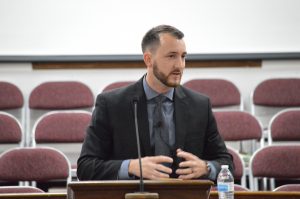 The book of Colossians only uses the word “cross” twice, yet the shadow of the cross covers the entire book and the entire Bible. The cross is our path to peace. The road to reconciliation begins with a problem: there is a broken relationship that has caused enmity and war. The plan for the problem is the cross. The purpose of the cross is to bring peace. The cross is also the foundation of forgiveness for all past and future sin. Christ nailed to the cross the law which condemned us, and, in dying, he fulfilled the law. When Christ arose, the law did not; it remains nailed to the cross, never to condemn us again. We must tell others of the peace and forgiveness found only in the cross.
The book of Colossians only uses the word “cross” twice, yet the shadow of the cross covers the entire book and the entire Bible. The cross is our path to peace. The road to reconciliation begins with a problem: there is a broken relationship that has caused enmity and war. The plan for the problem is the cross. The purpose of the cross is to bring peace. The cross is also the foundation of forgiveness for all past and future sin. Christ nailed to the cross the law which condemned us, and, in dying, he fulfilled the law. When Christ arose, the law did not; it remains nailed to the cross, never to condemn us again. We must tell others of the peace and forgiveness found only in the cross.
The Influence of the Cross in the Epistle to the Ephesians
Matthew Brown
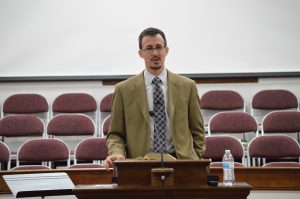 Paul in writing to the Ephesians mentions their past. Their world was divided between Jew and Gentile, and as Gentiles, they were far off, at enmity physically, ceremonially, and spiritually with the Jew and with God. Yet now all of this was in their past. The cross provided peace and bridged the gap between God and man and between man and man. We must remember that we too were sinners, reflect on our attitudes towards others, and rejoice that Christ has brought all together in peace.
Paul in writing to the Ephesians mentions their past. Their world was divided between Jew and Gentile, and as Gentiles, they were far off, at enmity physically, ceremonially, and spiritually with the Jew and with God. Yet now all of this was in their past. The cross provided peace and bridged the gap between God and man and between man and man. We must remember that we too were sinners, reflect on our attitudes towards others, and rejoice that Christ has brought all together in peace.
The Influence of the Cross in the Epistles to the Corinthians
Fred Daniel, Jr.
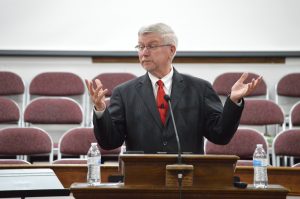 The cross gives the power for effective ministry in the local church. As we think of Corinth, we are reminded who Paul was. He witnessed Stephen’s death and was used by God for missions even before his own salvation. We also think of who Paul became. The cross made a difference in his life, and he was a chosen vessel to bear its message to the Gentiles. We also see how Paul served the Corinthians. He went to them and ministered to them for a year and a half as he nurtured and grounded them. Making converts is only part of the commission; it also includes making disciples. The cross provides power for preventive and corrective discipline. We must be willing to confront the problems in the church. In application, we should remember who we were before the cross, what we became at the cross, and that God has us here to serve Him because of the cross.
The cross gives the power for effective ministry in the local church. As we think of Corinth, we are reminded who Paul was. He witnessed Stephen’s death and was used by God for missions even before his own salvation. We also think of who Paul became. The cross made a difference in his life, and he was a chosen vessel to bear its message to the Gentiles. We also see how Paul served the Corinthians. He went to them and ministered to them for a year and a half as he nurtured and grounded them. Making converts is only part of the commission; it also includes making disciples. The cross provides power for preventive and corrective discipline. We must be willing to confront the problems in the church. In application, we should remember who we were before the cross, what we became at the cross, and that God has us here to serve Him because of the cross.
The Influence of the Cross on the Acts of the Apostles
Danny Whetstone
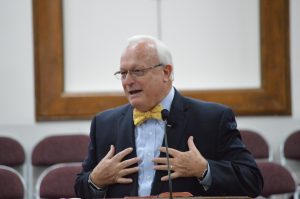 Without the cross, there would have been no resurrection, no ascension, and no coming of the Holy Spirit, so everything we see recorded in the book of Acts is a direct result of the cross. The Holy Spirit empowered the disciples, but never spoke of himself, only of Christ. This message is effective when it is propagated. Peter’s message at Pentecost mentioned almost every doctrine of Christ. Three thousand were converted, and all of them were baptized and all continued steadfastly. Stephen had no way of knowing how his message would work in the heart of Saul. We must preach Christ and allow the power of the cross to work in the lives of those who hear. When people are drawn to Christ they find redemption and then can go on their way rejoicing.
Without the cross, there would have been no resurrection, no ascension, and no coming of the Holy Spirit, so everything we see recorded in the book of Acts is a direct result of the cross. The Holy Spirit empowered the disciples, but never spoke of himself, only of Christ. This message is effective when it is propagated. Peter’s message at Pentecost mentioned almost every doctrine of Christ. Three thousand were converted, and all of them were baptized and all continued steadfastly. Stephen had no way of knowing how his message would work in the heart of Saul. We must preach Christ and allow the power of the cross to work in the lives of those who hear. When people are drawn to Christ they find redemption and then can go on their way rejoicing.
The Influence of the Cross in a Post-Christian World
Chad Estep
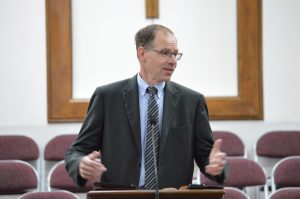 The cross is about our salvation and our sanctification. Therefore, its message is about transformation. The book of Romans was written in what could be considered a pre-Christian world and our post-Christian world today is no different. Chapters 12-16 give us several transformational truths. We must not think highly of ourselves, but soberly as Christ does. We must recognize our place in the body of Christ and realize that we are individual members whose actions can have a ripple effect on others. We must realize that God has given us a gift not for ourselves or others, but for him. Don’t worry what others think of your gift–just please God with it. We must serve others. We must remember that vengeance is coming and God is just. We must be transformed by renewing, refreshing, and reviving our minds daily.
The cross is about our salvation and our sanctification. Therefore, its message is about transformation. The book of Romans was written in what could be considered a pre-Christian world and our post-Christian world today is no different. Chapters 12-16 give us several transformational truths. We must not think highly of ourselves, but soberly as Christ does. We must recognize our place in the body of Christ and realize that we are individual members whose actions can have a ripple effect on others. We must realize that God has given us a gift not for ourselves or others, but for him. Don’t worry what others think of your gift–just please God with it. We must serve others. We must remember that vengeance is coming and God is just. We must be transformed by renewing, refreshing, and reviving our minds daily.
The Influence of the Cross in the Epistle to the Hebrews
Gene Krachenfels
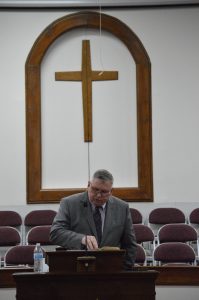 The book of Hebrews reminds us that we are in a race. God designed the course as a marathon. Christ’s course began in heaven, brought him to earth, and eventually took him to the cross, but there is joy in knowing it did not end at the cross. He crossed over the finish line to complete his race on streets of gold! God determines the conditions of the course. We must endure, press on, and continue. We must not resent, avoid, bypass, or become bitter at obstacles placed in our path. Remember that God dispenses the rewards at the end of the race. Great joy comes in the face of trials if we endure.
The book of Hebrews reminds us that we are in a race. God designed the course as a marathon. Christ’s course began in heaven, brought him to earth, and eventually took him to the cross, but there is joy in knowing it did not end at the cross. He crossed over the finish line to complete his race on streets of gold! God determines the conditions of the course. We must endure, press on, and continue. We must not resent, avoid, bypass, or become bitter at obstacles placed in our path. Remember that God dispenses the rewards at the end of the race. Great joy comes in the face of trials if we endure.
The Influence of the Cross on the Disciples – Us
John O’Malley
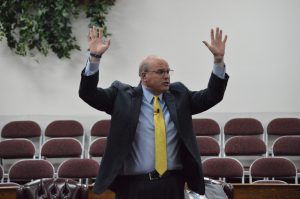 The cross must influence who we are as disciples of Christ today. In Luke 14 Christ tells the story of a supper that was offered. As a great multitude began to follow Him, Christ made three negative statements to thin the crowd and determine who would be true followers. The cross must influence who we are as servants. He stated that one cannot be his disciple without leaving family, bearing a cross, and forsaking all. Each of these statements requires a status with the Lord. How do we make a deliberate decision? How do we prevent a divided devotion? How do we avoid dereliction of our duty? To be followers of Christ we must realize that Christ has a cross for us that is individualized and personalized. He wants us to carry his cross, not as an object of ornamentation, but as an invitation to die with Him. He wants us to follow him with our cross. We must bear the cross He has given with honor, and remember that His cross was far more difficult than ours.
The cross must influence who we are as disciples of Christ today. In Luke 14 Christ tells the story of a supper that was offered. As a great multitude began to follow Him, Christ made three negative statements to thin the crowd and determine who would be true followers. The cross must influence who we are as servants. He stated that one cannot be his disciple without leaving family, bearing a cross, and forsaking all. Each of these statements requires a status with the Lord. How do we make a deliberate decision? How do we prevent a divided devotion? How do we avoid dereliction of our duty? To be followers of Christ we must realize that Christ has a cross for us that is individualized and personalized. He wants us to carry his cross, not as an object of ornamentation, but as an invitation to die with Him. He wants us to follow him with our cross. We must bear the cross He has given with honor, and remember that His cross was far more difficult than ours.
Practical Sessions
Family Fellowship Week is about more than just preaching! Our desire is for it to be a place of fellowship where we can feed your soul, familiarize you with our staff, and allow you to focus on our commitments to each other. Two of our board members’ wives spoke to the ladies, and our Director of Deputation spoke on ministry families. Below are notes and links for these practical sessions. We have also included links for Principles and Practices, as well as the Q&A time.
Each message below contains links to the audio via our Uplift podcast site. In order for the direct links to work, you must be logged in with the username: wwntbm and the password: gospel.
Bloom Where You Are Planted – A Lesson of Fruitfulness
Karen Daniel
Sometimes we think we are being buried when we are really being planted. God must plant us so we can grow, bloom, and bear fruit. Plants start as seeds that are dormant; we too are dead without Christ, but salvation brings new life. Just as a pl ant needs roots we need a foundation. Seedlings are tender and need to be watched carefully, so new Christians need us to be sensitive to their needs as they are being transformed. When the plant reaches the blooming stage it begins to bear fruit. We as Christians must bloom with grace. Our fruit comes from Him, not us, and we must not take pride in what Christ does through us. Remember that God made a variety of plants and has made a variety of people as well. Variety gives beauty. Do not try to be someone else. Fake flowers may appear beautiful but they never change, and they never bear fruit. Plants need nourishment to flourish. The Bible is our spiritual ‘miracle-grow.’ Without it, we may think we are ok, but we will never flourish. The flourishing plant draws the attention of passers-by, and the fruit of the spirit blooming in our lives draws others to Christ. Plants may have good or bad aromas, and our attitudes should radiate a sweetness to others. Crushed plants provide ointments. Trials in our life bring the balm of Christ to our souls. Plants can be re-potted, and sometimes in our lives, Christ moves us to a new location. We must bloom where He plants us, so the beauty and fragrance of our lives will draw others to Christ.
ant needs roots we need a foundation. Seedlings are tender and need to be watched carefully, so new Christians need us to be sensitive to their needs as they are being transformed. When the plant reaches the blooming stage it begins to bear fruit. We as Christians must bloom with grace. Our fruit comes from Him, not us, and we must not take pride in what Christ does through us. Remember that God made a variety of plants and has made a variety of people as well. Variety gives beauty. Do not try to be someone else. Fake flowers may appear beautiful but they never change, and they never bear fruit. Plants need nourishment to flourish. The Bible is our spiritual ‘miracle-grow.’ Without it, we may think we are ok, but we will never flourish. The flourishing plant draws the attention of passers-by, and the fruit of the spirit blooming in our lives draws others to Christ. Plants may have good or bad aromas, and our attitudes should radiate a sweetness to others. Crushed plants provide ointments. Trials in our life bring the balm of Christ to our souls. Plants can be re-potted, and sometimes in our lives, Christ moves us to a new location. We must bloom where He plants us, so the beauty and fragrance of our lives will draw others to Christ.
Sticking To It – A Lesson of Faithfulness
Becky Estep
 God’s faithfulness is foundational to all of His promises. Since He is always faithful, we too must be faithful to stick with it as a testimony to others. We should pray to be faithful, realizing the devil fights against our faithfulness. Look at the big picture. God already sees the end. To be faithful over decades, you must start early. Write down your decisions so you don’t forget them! Expect change, not in doctrine or beliefs, but in life circumstances. It requires adaptability and a realistic outlook on life to be faithful through changes. Don’t make major decisions in low times. Low seasons bring a change in perspective. Allow Christ to patiently work in you the change he desires in the low times, before making a decision to move from this place. Hold fast to his promises and trust for his outcome. Realize that trials come to everyone and in all locations. Seek counsel. Talk with others and read a variety of perspectives. In a multitude of counselors, there is safety and security. Give thanks in everything. Gratitude affects your attitude. When you realize all God has done for you, you can’t help but desire to be faithful to him. God has a specific job for you and you are the only one who can fill it. Every person is faithful to something. The problem is the object of our faithfulness. Faithfulness doesn’t happen by accident. Faithfulness results in encouragement and security.
God’s faithfulness is foundational to all of His promises. Since He is always faithful, we too must be faithful to stick with it as a testimony to others. We should pray to be faithful, realizing the devil fights against our faithfulness. Look at the big picture. God already sees the end. To be faithful over decades, you must start early. Write down your decisions so you don’t forget them! Expect change, not in doctrine or beliefs, but in life circumstances. It requires adaptability and a realistic outlook on life to be faithful through changes. Don’t make major decisions in low times. Low seasons bring a change in perspective. Allow Christ to patiently work in you the change he desires in the low times, before making a decision to move from this place. Hold fast to his promises and trust for his outcome. Realize that trials come to everyone and in all locations. Seek counsel. Talk with others and read a variety of perspectives. In a multitude of counselors, there is safety and security. Give thanks in everything. Gratitude affects your attitude. When you realize all God has done for you, you can’t help but desire to be faithful to him. God has a specific job for you and you are the only one who can fill it. Every person is faithful to something. The problem is the object of our faithfulness. Faithfulness doesn’t happen by accident. Faithfulness results in encouragement and security.
Ministry Families
Jeremy Lockhart
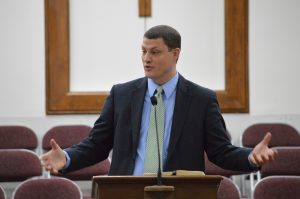 This session covered lessons the Lockharts have learned during their deputation, field, and furlough ministries, as well as during changes in ministry.
This session covered lessons the Lockharts have learned during their deputation, field, and furlough ministries, as well as during changes in ministry.
1 – Be yourself. What you do to gain support is what you will have to do to keep it. Be genuine.
2 – Teach your kids to obey, but don’t be too harsh. Don’t provoke them to anger by expecting them to act like adults. Don’t make bad scheduling decisions and sacrifice your family to meet your goals, then discipline them for something that was your fault when you should have given them time to be rested.
3 – Deputation is a time of ministry. It is an opportunity to speak in churches where the pastor has often never met you! Don’t squander the time thinking only of raising funds. Deputation is a time to expose the church to missions and to burden the hearts of the next generation of missionaries.
4 – Let no man despise your youth. You don’t have the same perspective but you do have influence. Often young folks look to the generation immediately above them for inspiration, not to generations several years older. Your youth will energize and encourage the church.
5 – Don’t be lifted up in pride. You don’t know it all.
6 – Deputation is a time to develop relationships. Learn to humble yourselves to receive gifts from others. Be a friend to those you meet along the way.
7 – Relationships are important. Spend time with people. Love them. Learn from them. Ask questions. Learn to dialogue and find out what people understand from what you tell them. Study the list of questions Christ asked of individuals; He was always seeking to find their understanding and perspective of the situation.
Principles and Practices
Bill Wingard and Danny Whetstone
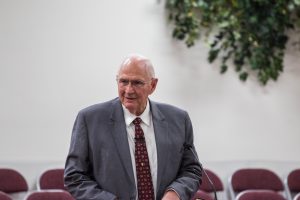 Each year at Family Week, we review the principles and practices that define our missions agency. We do this to remind ourselves of where we came from and what we stand for and to ensure that we will not change our principles as we move into the future.
Each year at Family Week, we review the principles and practices that define our missions agency. We do this to remind ourselves of where we came from and what we stand for and to ensure that we will not change our principles as we move into the future.
Click here to listen to Part 1 with Bill Wingard.
Click here to listen to Part 2 with Danny Whetstone.
Questions and Answers
John O’Malley and Danny Whetstone
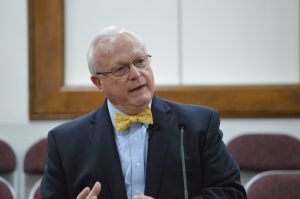 Missionaries in attendance were asked to submit questions to our staff. Topics ranged from ministries to families, and from theological to practical matters. Click here to listen to this informative session.
Missionaries in attendance were asked to submit questions to our staff. Topics ranged from ministries to families, and from theological to practical matters. Click here to listen to this informative session.
Evening Sessions
Each year at Family Week, the daily sessions focus on our missions family, while the evening messages include the host church family. Four speakers are selected to challenge and encourage hearts for the cause of missions.
Each message below contains links to the audio via our Uplift podcast site. In order for the direct links to work, you must be logged in with the username: wwntbm and the password: gospel.
The Spirit of the Lord GOD
John O’Malley
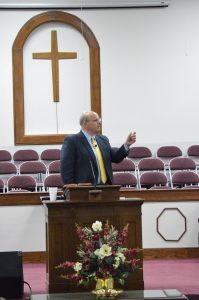 Isaiah 61 is the only passage that uses the phrase, “The Spirit of the Lord GOD.” Christ referred to this passage at the beginning of his own ministry. There are great parallels here for us. We learn that we have a manager – one who manages. We do not need to wonder about our future or tasks, because the manager is in charge – we can simply ask Him. A manager brings a mess into order, gives marching orders, and is responsible for the strength, stability, success, safety, supply, and sustenance of the workers. Christ our manager reassures us that He bought us, loves us, wants us, and we are His! We also have a multitude. We have people to whom we are to bring good tidings. We have a message. We must proclaim the year of the Lord and the day of His victory and vengeance. We have a mandate to produce an exchange of beauty for ashes, joy for mourning, and praise for heaviness. The supply for this exchange is limitless and comes from our manager. We also have a mandate to plant trees of righteousness. The purpose for it all is so that Christ will get the credit and glory.
Isaiah 61 is the only passage that uses the phrase, “The Spirit of the Lord GOD.” Christ referred to this passage at the beginning of his own ministry. There are great parallels here for us. We learn that we have a manager – one who manages. We do not need to wonder about our future or tasks, because the manager is in charge – we can simply ask Him. A manager brings a mess into order, gives marching orders, and is responsible for the strength, stability, success, safety, supply, and sustenance of the workers. Christ our manager reassures us that He bought us, loves us, wants us, and we are His! We also have a multitude. We have people to whom we are to bring good tidings. We have a message. We must proclaim the year of the Lord and the day of His victory and vengeance. We have a mandate to produce an exchange of beauty for ashes, joy for mourning, and praise for heaviness. The supply for this exchange is limitless and comes from our manager. We also have a mandate to plant trees of righteousness. The purpose for it all is so that Christ will get the credit and glory.
Pure Hearts and Fervent Love
Bill Wingard
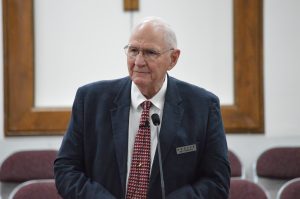 Our purpose is to make Christ known, that men may know Him, and that the world will know that we know Him. We have evidence they may not like, but cannot dispute, when we show our changed life and our love for others. The love of God flows through a life that has been genuinely changed. The world knows we are disciples when we love. Love is an international blessing from God. It is a defense in our lives against sin. The blood cleanses our sin, and love covers our sin. (I Peter 4:8) I Corinthians 13 compares faith, without which we cannot please God; hope, without which we have no confidence; and love, without which our service is worthless. Love is the greatest of these three!
Our purpose is to make Christ known, that men may know Him, and that the world will know that we know Him. We have evidence they may not like, but cannot dispute, when we show our changed life and our love for others. The love of God flows through a life that has been genuinely changed. The world knows we are disciples when we love. Love is an international blessing from God. It is a defense in our lives against sin. The blood cleanses our sin, and love covers our sin. (I Peter 4:8) I Corinthians 13 compares faith, without which we cannot please God; hope, without which we have no confidence; and love, without which our service is worthless. Love is the greatest of these three!
Missions and the Modern Generation
Caleb Rollins
 What does the future hold for the next generation? When facing Goliath, David had a vision of what had to be done. He was able to do one simple thing by stepping out in faith and being willing to attempt what nobody else would do. As a young boy, Samuel kept listening to the call of God. His circumstances were not good. He was in the place of the ark yet did not know the Lord. His mentor was failing spiritually and could not help him. He slept while the flame went out. Yet in spite of circumstances, he listened and answered the call of God. When being held captive by Naaman, the little maid saw a need and answered her master’s cry for help. She was willing to realize that God had her in that place for a reason. Each of these young people had a vision, heard the call, and acted on the call of God for their lives. We must keep the vision, keep listening, and act upon the call of God in our lives as well.
What does the future hold for the next generation? When facing Goliath, David had a vision of what had to be done. He was able to do one simple thing by stepping out in faith and being willing to attempt what nobody else would do. As a young boy, Samuel kept listening to the call of God. His circumstances were not good. He was in the place of the ark yet did not know the Lord. His mentor was failing spiritually and could not help him. He slept while the flame went out. Yet in spite of circumstances, he listened and answered the call of God. When being held captive by Naaman, the little maid saw a need and answered her master’s cry for help. She was willing to realize that God had her in that place for a reason. Each of these young people had a vision, heard the call, and acted on the call of God for their lives. We must keep the vision, keep listening, and act upon the call of God in our lives as well.
Beyond Our Fondest Dreams
Danny Whetstone
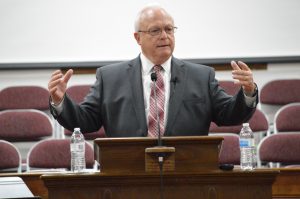 Paul begins Ephesians 3 by calling himself a prisoner, not of Rome, but of Christ. He knew God had him in that place for a reason and believed he was right in the center of God’s will. He was willing to face great persecution for a cause he knew to be right because he had a cause – the ministry and mystery of sharing the Gospel with the Gentiles. He desired that God would strengthen these believers with the Spirit, that Christ would dwell in them, and that grounded in love they would be able to comprehend Christ’s love which passes knowledge. With this cause in mind, he closed the chapter with a challenge to dream big in ministry. This God who fills our lives is able. We can live this life beyond our wildest dreams. No dream is too big until it exceeds the ability of God. Nothing is impossible for the One who can hear the dreams of our heart. We fear that men will laugh at our dreams, but just because they don’t know how to dream doesn’t mean we should not do so. What dream do you have for your life that will honor God and bring glory to Christ? Rise up in humility and in the knowledge of the love of God, ask Him to grant you your wishes, and watch Him fulfill your fondest dreams.
Paul begins Ephesians 3 by calling himself a prisoner, not of Rome, but of Christ. He knew God had him in that place for a reason and believed he was right in the center of God’s will. He was willing to face great persecution for a cause he knew to be right because he had a cause – the ministry and mystery of sharing the Gospel with the Gentiles. He desired that God would strengthen these believers with the Spirit, that Christ would dwell in them, and that grounded in love they would be able to comprehend Christ’s love which passes knowledge. With this cause in mind, he closed the chapter with a challenge to dream big in ministry. This God who fills our lives is able. We can live this life beyond our wildest dreams. No dream is too big until it exceeds the ability of God. Nothing is impossible for the One who can hear the dreams of our heart. We fear that men will laugh at our dreams, but just because they don’t know how to dream doesn’t mean we should not do so. What dream do you have for your life that will honor God and bring glory to Christ? Rise up in humility and in the knowledge of the love of God, ask Him to grant you your wishes, and watch Him fulfill your fondest dreams.
Family Fellowship Week 2018 Quotes
Too many Christians are in a place where the door of their prison is open, and their chains of sin are broken, but they are still sitting in prison because they have not chosen to follow Christ by getting up and walking out of the door away from their past! Michael West
The cross had long been a fundamentally divisive symbol, yet when Christ was crucified it became a symbol of unity. Matthew Brown
Cross-focused missionaries can experience the power of the cross in their ministries. Fred Daniel, Jr.
A casual approach or lack of preparation for a sermon is a horrible disrespect to the Savior who died for us. You will never preach effectively if you do not study effectively. Tim Daniel
My sin sent Christ to Calvary, but his love took him there. John O’Malley
The profundity of Scripture lies in its simplicity. Bill Wingard
When the older generation loses their vision the younger generation loses their hope. We must not fail to share our vision with the next generation. Caleb Rollins
